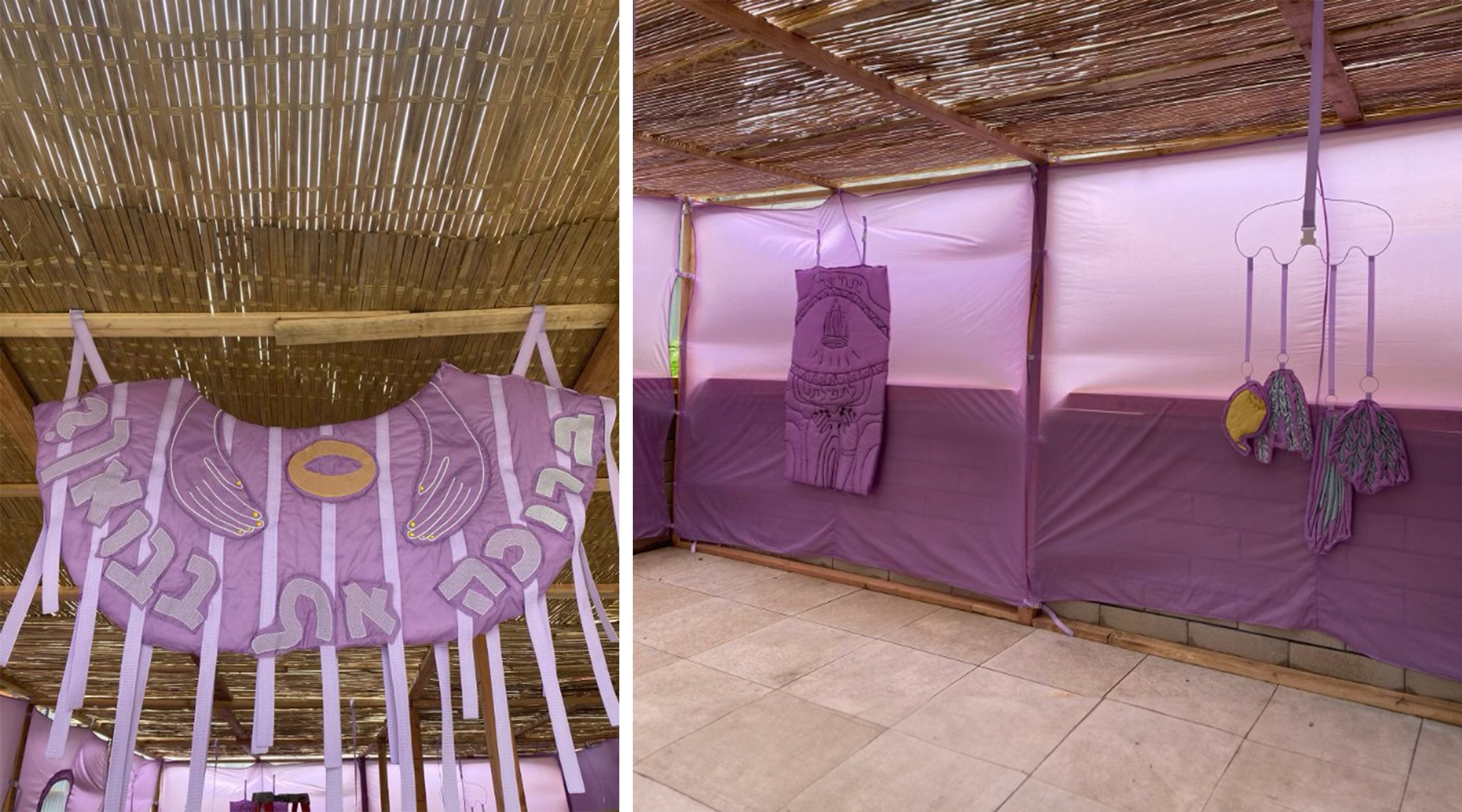(New York Jewish Week) — On Friday evening, several dozen people huddled underneath umbrellas and raincoats in a new sukkah in Brooklyn that had survived the day’s record-setting rainstorm.
The sukkah, created by queer textile artist Hilla Shapira, was unharmed: Its light purple walls were made of ripstop, a lightweight and water-resistant fabric. Its soft and pillowy decorations — which included Jewish symbols like hamsas as well as depictions of the four species — were made of dacron, a durable, polyester batting that held up in the deluge as well.
Shapira said the project — titled Lavender Diaspora — was meant to channel her identities as a queer person who grew up in a religious household in Israel, and also as an immigrant in the United States, where she studied art in Michigan before moving to Brooklyn.
“I try to find parallel relationships between what it is to be queer and Jewish, and to be a person from Israel,” Shapira, 33, told the New York Jewish Week. “It’s especially relevant when we’re talking about Sukkot, which is a holiday that the Jewish people were celebrating in the in-between space, between Egypt and Israel — they were on the way somewhere, but in something that is temporary and stuck in this kind of forever nomadism.”

Shapira holding one of her hamsas as she builds Lavender Diaspora in Prospect Heights. (Courtesy The Neighborhood.)
Speaking at a Shabbat dinner hosted by The Neighborhood: An Urban Center for Jewish Life, the Brooklyn-based organization that commissioned the sukkah, Shapira said she had designed her structure to celebrate communities that find themselves on the outskirts of society.
She was speaking on the first night of Sukkot, the weeklong holiday in which Jews build a temporary structure called a sukkah, meant to commemorate in part the structures that the Israelites lived in as they wandered through the desert from Egypt to Israel. Throughout the holiday, which ends at sundown on Saturday, Jews eat, pray and even sleep in the sukkah.
The Neighborhood has partnered with 12 other Jewish communities and organizations to celebrate and host events in the unique sukkah, including Romemu Brooklyn, Lab/Shul, Jews of Color Initiative and the Prospect Heights Shul.
“We were really excited to think about not just a sukkah as an art object, but really also as a place to bring different communities and groups of people together in this temporary structure,” Rebecca Guber, the founding director of The Neighborhood, told the New York Jewish Week.
“We also thought about what were some different perspectives that we could bring into this stuff,” she added. “We wanted something that brings in young families, that would be comfortable if you’re a more observant Jew and that also feels kind of wild.”
Located in the courtyard of Luria Academy, a Jewish day school in Prospect Heights, students will use the sukkah for their meals and programming during the day. In the evenings and on the weekend, The Neighborhood will use the sukkah for its own programming, which includes the launch of a Sukkot zine in partnership with Ayin Press, a family-friendly music jam, a dance event and more.
As a queer woman who grew up in an Orthodox home in Israel — as well as an immigrant to the United States — Shapira said she’s often searched for a sense of belonging. “The sukkah I tried to create is a space that is offering an alternative, or making a suggestion for a communal space for all the ‘shoulders’ of society,” she said.
Lavender, the color of the walls of the sukkah, is a symbol of LGBTQ resistance and activism. The other half of the title, Diaspora, refers to both the dispersion of the Jewish people as well as the feeling of marginalization experienced by Jews, LBGTQ people and other minorities — the sukkah is meant to be a temporary space that alleviates that feeling.
The Neighborhood is a community hub that primarily partners with other Jewish organizations to create innovative Jewish cultural and spiritual events for Jewish life. The Lavender Diaspora sukkah was funded by UJA-Federation New York. (UJA-Federation is also a funder of 70 Faces Media, the parent company of the New York Jewish Week.)
“What really resonates for us is the way that this sukkah welcomes everyone in — whatever position you feel you occupy in the Jewish community — maybe some people feel like insiders, other feel like outsiders, we really hope this can be a place where many different people can feel welcomed, and that their perspectives and identities are being honored,” Guber said.
The New York Jewish Week brings you the stories behind the headlines, keeping you connected to Jewish life in New York. Help sustain the reporting you trust by donating today.





